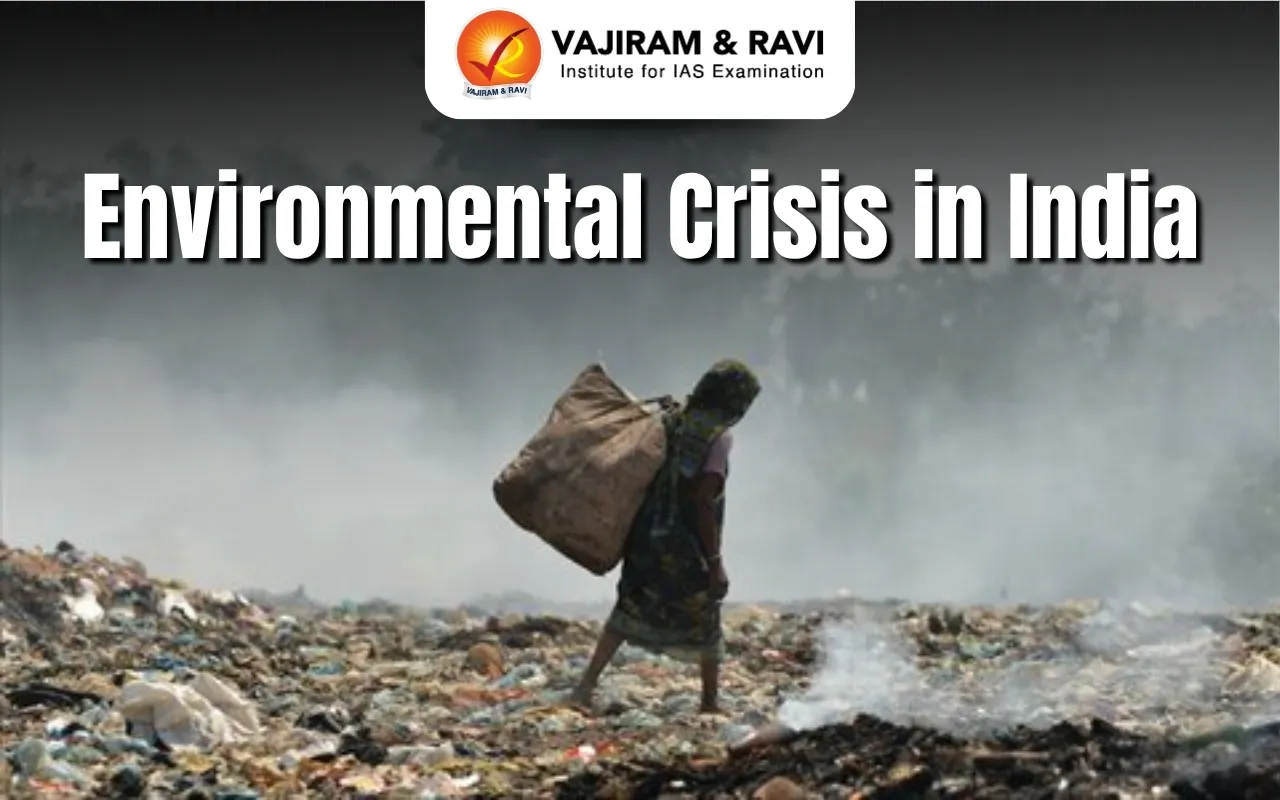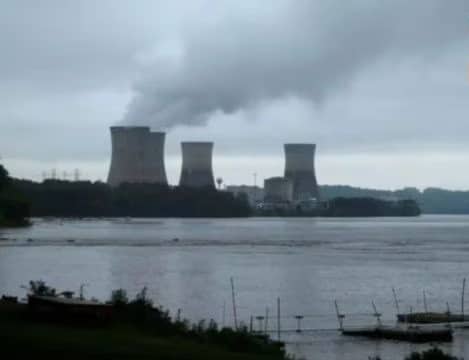Environmental Crisis in India Latest News
- On World Environment Day (June 5), it is a moment to reflect on how the past decade has either worsened or helped address ongoing environmental crises.
Major Environmental Crises in India and the World
- Triple Planetary Crisis
- The world is currently facing three interlinked environmental challenges:
- Carbon Emissions
- Biodiversity Loss
- Pollution
- The world is currently facing three interlinked environmental challenges:
- Rising Carbon Emissions
- Between 2015 and 2024:
- Global CO₂ emissions increased by nearly 10%, from 34.1 to 37.4 billion metric tonnes.
- India’s emissions rose from 2.33 to 3.12 billion metric tonnes, primarily due to continued reliance on coal and oil.
- Between 2015 and 2024:
- Biodiversity Under Threat
- India’s rich biodiversity is under severe stress due to:
- Deforestation
- Wetland degradation
- Expansion of monoculture agriculture
- Mass extinctions and ecological disruptions are becoming increasingly common.
- India’s rich biodiversity is under severe stress due to:
- Persistent Pollution
- Air pollution remains a major issue, with India among the most polluted countries globally.
- Delhi consistently ranks at the top of global pollution indexes.
Root Causes of Environmental Degradation
- Fossil Fuel Dependency
- Major source of global carbon emissions.
- In India, nearly 70% of electricity is generated from coal.
- Emissions from power generation, transport, and industry are key contributors.
- Deforestation and Land-Use Change
- Forest clearances for infrastructure projects (roads, mining, dams) are rising.
- Biodiversity-rich regions like the Western Ghats and Northeast are most affected.
- Agricultural Intensification
- High-input monocultures by agribusinesses damage ecosystems.
- Water bodies are polluted with nitrates, pesticides, and plastics.
- Waste Mismanagement and Urbanisation
- Rapid, unchecked urban growth leads to unregulated landfills and untreated sewage.
- Rivers like the Ganga and Yamuna are heavily polluted.
- India produces 62 million tonnes of waste annually; only 20% is processed properly.
- Overconsumption and Industrialisation
- Excessive consumption in the Global North shifts environmental costs to the Global South.
- Global supply chains externalise pollution and ecological harm to developing countries.
India’s Position in the Global Environmental Crisis
- Low Per Capita Emissions, High Aggregate Impact
- India’s per capita carbon footprint is ~1.9 tonnes/year, much lower than the U.S. (~14.7 tonnes).
- However, overall emissions are increasing due to industrialisation and urbanisation.
- Disproportionate Impact on the Poor
- Marginalised communities suffer most from pollution and climate shocks.
- Examples include air pollution in Delhi’s slums and droughts in rural Maharashtra.
- Victim of Global Environmental Damage
- Historical emissions from richer countries have worsened India’s climate.
- Impacts include erratic monsoons, floods, and extreme heat.
- Biodiversity loss is undermining India’s food security and health systems.
Steps Toward Addressing the Environmental Crisis
- Global North Accountability
- Wealthy nations must reduce emissions significantly.
- Provide climate finance to developing countries.
- End the outsourcing of polluting industries.
- Corporate Responsibility
- Enforce strict environmental laws and implement carbon taxes.
- Ban market access for companies violating green policies.
- Promote corporate adherence to sustainable practices.
- Ecological Development Models
- Development should prioritize ecological sustainability.
- Support for low-carbon livelihoods and eco-friendly industries is essential.
- Promote Sustainable Practices
- Encourage ecological agriculture and reduce monocultures.
- Foster community-led conservation initiatives.
- Implement systemic changes for long-term environmental resilience.
Environmental Crisis in India FAQs
Q1. What are the major environmental crises India faces today?
Ans. India faces carbon emissions, biodiversity loss, and severe pollution, forming a triple planetary crisis.
Q2. Why is fossil fuel dependency a major issue?
Ans. Coal powers 70% of India’s electricity, increasing emissions from energy, transport, and industries.
Q3. How does urbanisation worsen environmental degradation?
Ans. Unchecked urbanisation causes waste mismanagement, pollution, and stress on natural resources and ecosystems.
Q4. Why is India vulnerable to global environmental damage?
Ans. Climate change impacts India’s monsoons, floods, and food systems due to historical emissions of richer nations.
Q5. What are key solutions to India’s environmental crisis?
Ans. Global accountability, corporate regulation, green policies, and sustainable, low-carbon development models are essential.
Last updated on December, 2025
→ Check out the latest UPSC Syllabus 2026 here.
→ Join Vajiram & Ravi’s Interview Guidance Programme for expert help to crack your final UPSC stage.
→ UPSC Mains Result 2025 is now out.
→ UPSC Notification 2026 is scheduled to be released on January 14, 2026.
→ UPSC Calendar 2026 is released on 15th May, 2025.
→ The UPSC Vacancy 2025 were released 1129, out of which 979 were for UPSC CSE and remaining 150 are for UPSC IFoS.
→ UPSC Prelims 2026 will be conducted on 24th May, 2026 & UPSC Mains 2026 will be conducted on 21st August 2026.
→ The UPSC Selection Process is of 3 stages-Prelims, Mains and Interview.
→ UPSC Result 2024 is released with latest UPSC Marksheet 2024. Check Now!
→ UPSC Prelims Result 2025 is out now for the CSE held on 25 May 2025.
→ UPSC Toppers List 2024 is released now. Shakti Dubey is UPSC AIR 1 2024 Topper.
→ UPSC Prelims Question Paper 2025 and Unofficial Prelims Answer Key 2025 are available now.
→ UPSC Mains Question Paper 2025 is out for Essay, GS 1, 2, 3 & GS 4.
→ UPSC Mains Indian Language Question Paper 2025 is now out.
→ UPSC Mains Optional Question Paper 2025 is now out.
→ Also check Best IAS Coaching in Delhi
Tags: environmental cisis in india mains articles upsc current affairs upsc mains current affairs

















